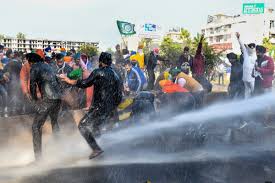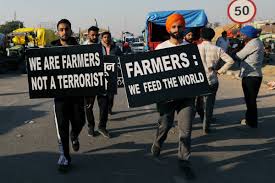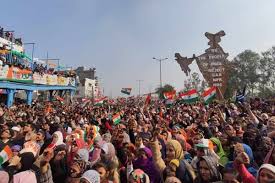
Ever since the Farm Bills 2020 that constitute three agricultural bills were passed by the Indian Parliament in September this year, farmers across the country have been protesting against them. These protests have seen burning of tractors and blocking of railway tracks. The latest in this series of protests has seen thousands of farmers from Punjab, Haryana and western UP protesting in and around the national capital while trying to make their way to New Delhi.
These protests have once again thrown light on the different perceptions people have when it comes to protests. To read more about the Farm Bills, click here!
What does the constitution say?
Articles 19(1)(a) and 19(1)(b) of the Indian Constitution provide the right to freedom of speech and expression, and the right to assemble peaceably and without arms to the citizens of India. Although this is subjected to reasonable restrictions under other articles of the constitution, the fact remains that Indians have the right to protest for a cause they believe in.
The Pro-Protest View
Some people believe that protests are an essential tool in a democracy, a way to show dissent with the decisions or current circumstances. Protests also bring together like-minded people, often making them realise that they are not alone. It is true that a protest instantaneously amplifies the discussion around a topic causing many influential people to come out and take a stand. It sometimes leads to a reversal of policies or an improvement in the situation, and if not that then a protest at least initiates discussion on an issue. 
A study by economists from Harvard University and Stockholm University found that protests do influence politics, just in a different way than one might think. The research showed that protests have a significant impact, not because the big crowds send a signal to policy-makers but because they make people politically active, which in turn brings about a change.
The farmers worry that the new laws will eventually end MSP (Minimum Selling Price) support unless there’s a legal guarantee from the central government that no procurement will happen below MSP throughout the country. The fact that some farmers say they were forced to sell their produce below MSP during lockdown restrictions has increased their concern.
The government’s ally in the Lok Sabha, Shiromani Akali Dal quit the NDA over the farm bills as the government did not listen to them about honouring the sentiments of the farmers. Since all laws are now on their way to become the law farmers are left with no option but to take to the streets to save their livelihood. 
Pandemic and Protests can’t coexist view.
Then some believe that protests should not be carried out, because they believe that with the coronavirus on the rise across the world, protests would act as “super spreader” events; all the while understanding that it is an instrument of change and a weapon of the masses. This was one of the concerns regarding the “Black Lives Matter” protests held across multiple states in the USA.
Health care officials were worried that these would contribute to an increase in the number of cases, but the numbers say otherwise. This can be attributed to the fact that the protests were held outdoors and that most of the people wore masks. On the other hand, the farmers’ protest lacks social distancing, which has many experts concerned that it might turn into a superspreader event in a city that is already seeing a high number of cases.
The Anti-Protests View
Lastly, some think that protests should not happen. This view is not as unpopular as it sounds; some countries crackdown on protesters with the use of their military. China is one such example, during the 1989 Tiananmen Square protests, the government ordered a brutal military action to end the protests. In fact, internet censorship is so high in China that most of the students do not understand why protests are held.
Some of them also believe that since protests might lead to violence or police taking stringent actions to disperse the crowds that gather like tear gas or water cannons, protests should not be allowed. 
There have been a group of people who have also called the farmers protesting as anti-national. Others have said that anti-national forces have hijacked the protest. Considering that agriculture has contributed to almost 16% of our GDP last fiscal year, employs nearly 50% of workers and continues to be the backbone of our economy, it is only fair that we allow them to raise their concerns and issues with the legislature that will directly impact their source of earning. The fact that we are the largest producers of wheat, rice, pulses and spices and can increase our produce if farmers are provided with better equipment and financial security.
Throughout the years since independence, India has seen several protests by citizens on different issues ranging from the dissent of policies to social injustices. These, in turn, have also caused a series of petitions to be filed in courts across the country, some of which have delivered landmark judgements.
Another Protest in Recent Times
Multiple petitions were filed against the Shaheen Bhag protest against the Citizenship (Amendment) Act (CAA) for blocking the roads of New Delhi. These petitions questioned if the right of citizens to protest gave them the freedom to disrupt the lives of others living in the area, like blocking roads. During the hearings of these petitions, the court remarked that ”protesters cannot block the public roads and cause inconvenience to the general public”. 
This is one such judgement that recognised the rights of both the people protesting and the people whose lives were adversely impacted by the demonstrations. Once again reminding us that even though the constitution gives us the right to protest, it does not allow us to disrupt the lives of others while doing so.
While attending an online event to marls the 551st birth anniversary of Guru Nanak on November 30th, Canadian Prime Minister Justin Trudeau acknowledged the right of the Indian farmers to a peaceful protest and said: “Canada will always be there to defend the rights of peaceful protests.” His words were received with praise online while the official spokesperson for The Ministry of External Affairs in a statement called the comments “ill-informed and unwarranted”.
The tradition of protests goes back to the very genesis of democracy and the struggle for freedom, something that was very vital for the existence of India. Whether people agree with the agenda of a particular protest or not most people believe that there should be a place for dissent in a democracy.
Written by Cynthia Maria Dsouza for MTTN
Edited by Radhika Taneja for MTTN
Featured image: timesofindia.indiatimes.com
Image sources: jagranjosh.com, news18.com and financialexpress.com
Leave a Reply
You must be logged in to post a comment.